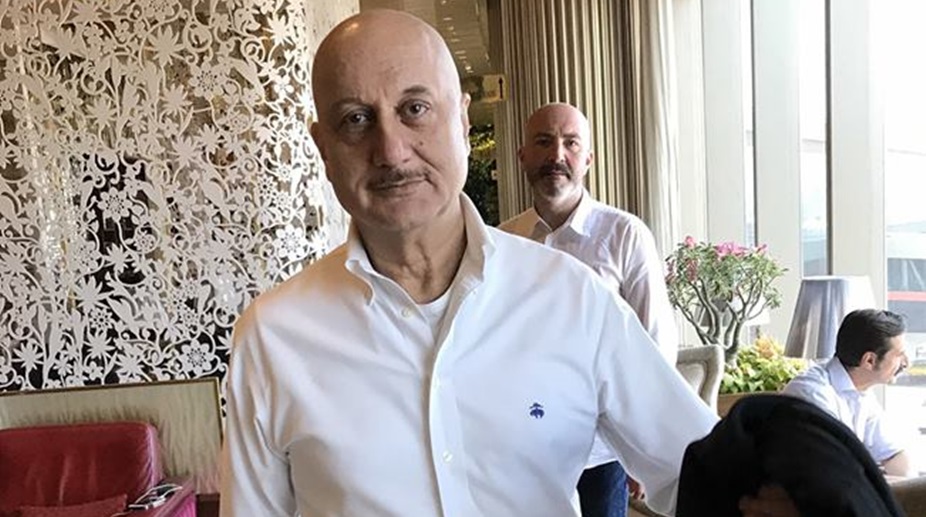Anupam Kher enlists Keiko Nakahara for ‘Tanvi The Great’
Anupam Kher's directorial venture 'Tanvi The Great' adds Japanese cinematographer Keiko Nakahara as DOP, enhancing its creative vision.

Anupam Kher (Photo: Facebook)
It has now become almost a ritual that appointments made in senior positions in government-run film institutes, especially in Pune, are met with protests on the campus. This is part of a recurring disapproval of administrative decisions —from restructuring of the curriculum to a strong resistance to the idea of the government scaling down its financial commitments.
The chain of such incidents reached a high point three years ago with the appointment of a chairman at the FTII in Pune —someone whose credentials consisted of his performances in a popular television serial and a few roles on the big screen that virtually went unnoticed. The resentment spilled over from the campus to other areas where directors and writers chose to join hands with the students to the extent of some returning their National Awards.
The institute remained closed for several months without any sign of solution despite several rounds of discussions with students. The strike fizzled out largely because the disruption hit the students more than anyone else. The newly-appointed chairman took charge thereafter but whatever initiative he may have otherwise shown in justifying the appointment had to cope with a drastically reduced tenure. Now there are reports in some quarters of fresh murmurs at FTII over the appointment of Anupam Kher as chairman.
Advertisement
The reasons have not been spelt out but it would appear that there are reservations again over the political connections of someone who has otherwise distinguished himself as an actor, theatre personality, a television host and the head of an acting school. There are obvious doubts about whether the tensions can at all be conducive to a healthy academic climate. The moot point is whether students who have benefited from subsidies and infrastructural opportunities should be so concerned about administrative issues unless these affect their academic programmes in any way. There was a somewhat alarming case of a chairman having, on one occasion, accepted a proposal to allow students to be “observers” during an interview for recruitment of faculty for the cinematography department.
Fortunately, the dubious concession was subsequently withdrawn. But the environment does not seem to have changed. Equally unfortunate is the veiled impression, often endorsed by directors who may have had long established connections with films schools, that creative work cannot be delinked from some degree of indiscipline. Hence there is a need to take a “more liberal” view in the case of film schools.
There is the frequent example given of Ritwik Ghatak, head of the Pune film institute in the 1970s, whose personal genius and excellent rapport with students had nothing to do with the way he conducted his own life. Ghatak and his admirers had one thing in common — a passion for the medium. Almost half a century later, the climate has changed. But with facilities as abundant as ever, the governmentrun film institutes ought to be producing a solid bank of trained hands in script writing, sound recording, cinematography, editing, animation and administration. If many belonging to the early batches have gone on to claim positions of their own, the number has been reduced to a trickle in later years.
What has survived is the impression that film schools run, for all practical purposes, by the government though they are described as “autonomous” should not be treated in the same way as other institutions that are in search of academic excellence. This probably explains the concern expressed in some quarters over reports (or rumours) about privatisation. One indication is that shortterm courses have been introduced as one way of ushering in a self-financing regime. This has evidently not gone down well with those who have thrived on benefits offered in the three-year residential curriculum. It may be one of the issues the new chairman will have to cope with.
But it does augur well for the Pune film institute that Kher has declared unequivocally that he will not be working on a pre-conceived agenda. Whatever “fears” that a section of students and others may have about his appointment must be seen in the light of the prevailing system in which the chairman simply heads the governing and academic councils that endorse crucial decisions. At the same time, the chairman is not concerned with day-to-day administration.
What Kher brings to the film institute is a vast experience that goes well beyond an acting career covering more than 500 films. It also includes his experience as a student during the institute’s best years. Equally significant was his stint at the Central Board of Film Certification that was happily spared the turmoil witnessed during the last few years.
As head of the National School of Drama and his own school of acting, he should have acquired the professional skills that were displayed in ample measure in his performances — it didn’t matter whether he was playing the comedian, the villain or the anxious parent in MSD:The Untold Story. He has been a professional more than a political activist with the capacity to extend his skills far and wide, including Hollywood.
The experience and the proven skills should prevail over other questions. The real test is whether he can use the experience and skills to bring the institute back on rails. Nothing else should matter.
Advertisement